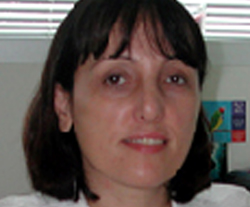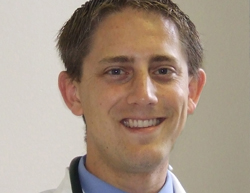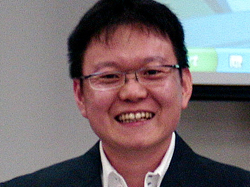Four researchers will receive 2009 Internal Medicine Research Awards for exceptional achievements in research. The researchers and their awards are:
- Julie Vose, M.D., Neumann M. and Mildred E. Harris Professor and chief of the section of oncology/hematology, will receive the Internal Medicine Career Excellence Research Award;
- Dee Harrison-Findik, D.V.M., Ph.D., assistant professor in the section of gastroenterology/hepatology, will receive the Internal Medicine Basic Science Research Award;
- Benjamin Miriovsky, M.D., house officer II in the department of internal medicine, will receive the Internal Medicine Resident Research Award; and
- Tadashi Sato, M.D., Ph.D.,research associate in the section of pulmonary, critical care, sleep, and allergy medicine, will receive the Laureate’s Award for a Visiting Scientist.
The awards will be presented today during the special Internal Medicine Grand Rounds at noon in the Durham Research Center Auditorium. Posters will be on display outside of the auditorium at 11:30 a.m. A grand rounds presentation by Dr. Vose will follow the awards presentation.
 |
Julie Vose, M.D. |
“Her career epitomizes one who has constantly striven to be at one’s personal best while advancing core beliefs that benefit the well-being of cancer patients through research and at the same time contributes to the mission of UNMC,” Dr. Vose’s nominator said.
During her career, the internationally renowned lymphoma expert has:
- Published 254 manuscripts published in peer-reviewed journals;
- Been an invited speaker at 225 national and international meetings;
- Authored or co-authored 38 book chapters;
- Held more than 90 grants or contracts, including her current role as principal investigator on an NCI/NHLBI “U” grant to establish the Nebraska Blood and Marrow Transplant Research Network;
- Served on editorial boards and as an invited reviewer for journals such as the New England Journal of Medicine, Annals of Internal Medicine and the Journal of Clinical Oncology;
- Served on several NIH study sections including her present role on the National Cancer Institute’s Clinical Oncology study section; and
- Been an NIH/NCI site reviewer.
Dr. Vose currently co-directs the Nebraska Lymphoma Study Group, an organization that has produced large amounts of data in the area of lymphoma research, and has been part of the Center for International Blood and Marrow Transplant Research for more than 15 years.
She also has successfully organized various educational programs nationally and internationally and she has chaired several committees for government and professional organizations that include:
- The Food and Drug Administration:
- The American Society of Clinical Oncology;
- The American Society for Blood and Marrow Transplantation; and
- The American Society of Hematology.
 |
Dee Harrison-Findik, D.V.M., Ph.D. |
Called an innovative and committed scientist, Dr. Harrison-Findik epitomizes the level of research accomplishments this award is established to honor, her nominator said.
Dr. Harrison-Findik — who joined UNMC in 2002 — has:
- Authored 23 articles in peer-reviewed journals and was first author on 11 of these articles;
- Secured a five-year RO1 grant to study the role of mitochondria and alcohol-mediated changes in the regulation of iron metabolism in the liver (this grant application was funded on its first submission);
- Garnered funding from the Alcoholic Beverage Medical Research Foundation to research alcohol-exposure-mediated regulation of hepcidin and iron metabolism in short-term, moderate alcohol exposure in vivo. This work has been published in journals such as the Journal of Biological Chemistry and Hepatology.
Because of her emerging reputation, she recently was invited by the European Society for Biomedical Research on Alcoholism as an expert for a workshop on iron and alcoholism. She also has received awards for her presentations at the American Association for the Study of Liver Diseases and the American Gastroenterological Association.
 |
Benjamin Miriovsky, M.D. |
According to Dr. Miriovsky’s nominator, he has already had several successful research experiences in spite of the hectic schedules as a medical student and resident.
As a medical student, he successfully prepared an abstract and manuscript, then as a resident turned his idea into a successful application for the prestigious American College of Rheumatology (ACR) Residency Research Award.
As part of the ARC award, Dr. Miriovsky accomplished several benchmarks of progress in the short timeframe of a three-month research elective. He was able to:
- Gain expertise in use of a rheumatology statistical package and familiarity with the Veterans Affairs Rheumatoid Arthritis (VARA) Registry;
- Independently perform statistical analyses outlined in his proposal;
- Summarize the results and submitted an abstract; and
- Complete an initial draft of a manuscript on his findings.
Dr. Miriovsky’s research focused on the association of anti-CCP antibody concentrations with clinical outcomes among U.S. veterans with rheumatoid arthritis.
 |
Tadashi Sato, M.D., Ph.D. |
“His work at UNMC is exceptional,” his nominator said.
Since coming to UNMC in 2007, Dr. Sato has initiated studies evaluating the effects of cytokines in stimulating prostaglandin E production in lung fibroblasts from normal and chronic obstructive pulmonary disease (COPD) subjects. In this work he has shown that:
- COPD subjects produce more prostaglandin E than controls;
- Increased expression of prostaglandin E biosynthetic enzymes that were regulated by micro RNA expression is the cause of the higher prostaglandin E levels; and
- Cytokine-induced micro RNA expression appeared to account for a significant portion of the differences between COPD and control fibroblasts.
These studies were presented at the American Thoracic Society in 2008 and a manuscript was submitted, as well.
Dr. Sato also initiated a second project examining the role of cytokines in altering differentiation of fibroblasts that may explain pathogenesis of persistent airway changes in human disease. He presented this work as an abstract at the recent 2009 American Thoracic Society meeting.